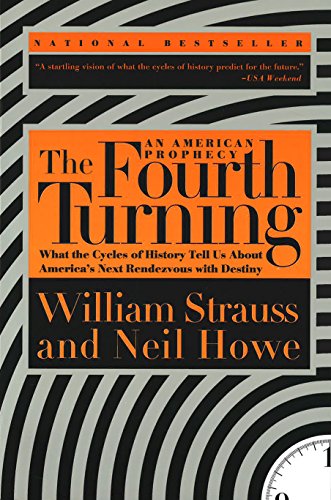
The Fourth Turning is a book written by William Strauss and Neil Howe, which details a theory of American history based on a cyclical model of generational archetypes. The authors argue that American history can be divided into four "turnings," each of which lasts approximately 20 years, and that these turnings are characterized by distinct generational archetypes that repeat in a predictable pattern.
The book outlines the four turnings as follows:
The First Turning: The High. This is a period of strong civic institutions, social trust, optimism, and a focus on community building. The archetype of this era is the Prophet generation, who are born into a period of hardship and use their experiences to create a new and better society.
The Second Turning: The Awakening. This is a period of cultural and spiritual upheaval, marked by a rejection of established social norms and a search for personal authenticity. The archetype of this era is the Nomad generation, who rebel against the values of the previous generation and seek to create a new identity and worldview.
The Third Turning: The Unraveling. This is a period of societal decay, marked by distrust of institutions, declining social cohesion, and a focus on individualism and self-preservation. The archetype of this era is the Hero generation, who are born into a time of crisis and must fight to overcome adversity and restore order.
The Fourth Turning: The Crisis. This is a period of intense upheaval and rapid change, marked by social upheaval, political turmoil, and the threat of external enemies. The archetype of this era is the Artist generation, who use their creativity and resourcefulness to rebuild society after the crisis has passed.
The authors argue that each turning sets the stage for the next, and that the generational archetypes that emerge in each era are shaped by the experiences and values of the previous generations. They also argue that the current era, which they identify as the Fourth Turning, began with the September 11th terrorist attacks and is characterized by the threat of global conflict, economic instability, and social unrest.
Overall, The Fourth Turning is a thought-provoking and controversial work that challenges traditional views of American history and offers a unique perspective on the cyclical nature of societal change. Description by ChatGPT.